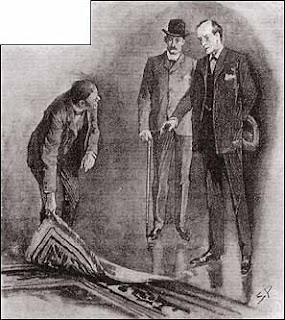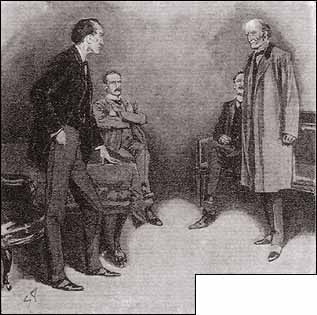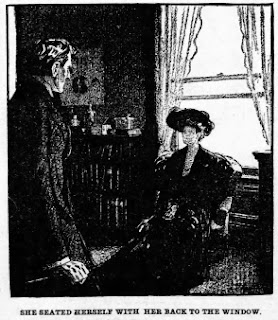Josh Harvey got special recognition on the latest episode of The Jeremy Brett Sherlock Holmes Podcast for his extensive knowledge of the music used on that show.
We’ve had two really great blog posts recently about this month’s story, The Second Stain. Rich posted in December and Bill had this month’s post.
Rob announced a new book from Wessex Press, The Finest Assorted Collection, and his new book of essays, The Common-Place Book.
The Legion of Zoom will be hosting an online conference on February 20.
Holmes, Doyle, and Friends will take place in Dayton, Ohio on March 11 & 12.
221B Con will take place in Atlanta, Georgia on April 8-10.
DePaul University’s Pop Culture Conference, “A Celebration of Sherlock Holmes” will take place in Chicago, Illinois on May 7.
The BSI will be hosting “Sherlock Holmes and the British Empire” in Bear Mountain, New York on July 29-31.
Our next meeting will be on March 19 via Zoom to discuss The Valley of Fear. Registration for that meeting will open on our Facebook page next month.
SECO starts off with a lot of information in its first paragraph: "Abbey Grange" was supposed to be the last story of the Canon. Holmes has retired to raise bees on the Sussex Downs. Watson had promised his readers that "The Second Stain" would be published eventually (in "The Naval Treaty" and "Yellow Face") and he was able to convince Holmes to let him publish this story because it was so important.
Rob noted that based off of the publication date, Holmes had only been retired for two months, so Watson couldn’t have been badgering him for too long about getting this in print.
In an unnamed year and an unnamed decade, Baker Street is visited by the Prime Minister, Lord Bellinger, and the Secretary for European Affair, Trelawney Hope. So much has been written about who these characters would have been in real life, but we wanted to get on with the story and didn’t spend much time arguing which Prime Minister it could be.
A document has gone missing and "peace or war may hang upon the issue."
It was a letter from a foreign potentate (most researchers think this would have been Kaiser Wilhelm II) that arrived six days ago. Hope kept the letter with him either in a safe at work or a locked dispatch box at home. It was in his room, unguarded, from 7:30-11:30 the previous night. And the letter was gone this morning.
Hope testifies that no one goes into his room. Except for Hope, his wife, the housemaid, his valet, his wife’s maid… you know, no one! Sonia said this setup reminded her of the “safety” in “The Beryl Coronet” and Ian pointed out that it was common practice for government officials to carry documents to and from work in their red boxes. Sandy thought that the answer was always that the butler did it. Susan pointed out that servants weren’t considered people and Beth thought it would be petrifying for these people to think about what all their servants could know about them.
Holmes asks for the specifics of the letter and the Prime Minister describes its physical shape and envelope. When Holmes asks for the letter’s contents, he is told that it was a state secret, to which Holmes replies, “I regret exceedingly that I cannot help you in this matter, and any continuation of this interview would be a waste of time.”
Bellinger gets mad and “for a minute or more we all sat in silence.” Holmes is not playing games. Either he gets the information or he’s not interested. Patrick noted how awkward that full minute must have been.
Kevin noted that the Prime Minister still didn’t tell Holmes what exactly was in that letter.
Rich pointed out that the Prime Minister told Bellinger that he could not be blamed because there was no precaution he failed to take. Rich then rattled off half a dozen precautions that could have been done.
Michael pointed out that Parliament passed the Official Secrets Act in 1899, so depending on where this story falls in chronology, it could or could not have been used against Lady Hilda or Trelawney Hope. Rob said that many chronologies list this as an early case so most of them have it before this act.
Holmes’s response to the Prime Minister’s disclosure? Prepare for war. If the letter disappeared 12 hours ago, it is most likely in the hands of one of the top three spies in London. Holmes will check on them to proceed but he doesn’t have high hopes.
Bellinger and Hope leave and Holmes begins to think over the problem. He tells Watson that he will try to buy the letter back from whichever spy has it. It is most likely with either La Rothiere, Oberstein, or Edwardo Lucas. Rob noted how he loves that Oberstein is used again in “The Bruce-Partington Plans.” There’s at least a little bit of continuity in the Canon!
Watson: You won’t talk to Edwardo Lucas. He was murdered last night. It’s always great when Watson knows something Holmes doesn’t!
Patrick noted how well this was executed in the Granada series and Kevin talked about the extra lines that were added to this conversation, maybe even improving on the original.
A constable discovered that Lucas’s house was in disarray and Lucas was stabbed in the heart with a dagger that was on display in his room. Watson says this is an amazing coincidence. Holmes: “The odds are enormous against its being a coincidence.”
Andy said maybe Holmes subscribed to the NCIS theory that there’s no such thing as coincidences and Rob said Holmes is wrong because it WAS a coincidence. Madeline dismantled that point by saying Lucas’s wife seeing him with Lady Hilda could have provoked the attack, making it NOT a coincidence. Michael pointed out that it wasn't just any woman, but one of the most beautiful women Watson had ever seen.
Right after this, Lady Hilda visits Baker Street and Watson is immediately smitten. She wants to know what exactly was stolen from her husband. Obviously, Holmes doesn’t tell her and she asks if her husband’s career will suffer to which Holmes says yes.
After she leaves, Holmes turns to Watson. “Now, Watson, the fair sex is your department.” Rob wondered why Holmes would ask for Watson’s take on the situation. He knows Watson is always swayed by a pretty face!
Elaine announced that she was happy to read this story just so she could remember that there was at least one happy story in the Canon. Shana pushed back and said that Lady Hilda’s fear of her husband finding out about a previous relationship could prove that it was not a happy marriage. Kevin wondered if Lady Hilda’s letter was as scandalous as the one in Sherlock Holmes’s Smarter Brother.
Watson tells us that “[a]ll that day and the next and the next Holmes was in a mood which his friends would call taciturn.” Rob wondered just who these “friends” of Sherlock Holmes were. Alisha argued that the word “friend” probably meant a different thing to Watson than it did to Holmes. Sandy noted all of the people Holmes kept in contact with and Patrick said maybe Watson considered them his friends. Jerry said it was just like Facebook friends.
Finally it was discovered that Mrs. Henri Fournaye was found out of her mind in Paris. She is actually Eduardo Lucas’s wife in his double life. She was the one who killed the spy. Holmes notes that what is important now is that nothing has happened in international relations, proving that the letter has not been used. The letter that did nothing in the night-time. Rich talked about how this argument works in the legal field as well.
Lestrade calls Holmes over to Lucas’s house over a trifle that he thinks Holmes might find interesting. The blood stain on the carpet doesn’t line up with the stain on the floor. After looking, Holmes tells Lestrade that his constable has let someone into the house and Lestrade storms off to confront the man.
Holmes scrabbles over the floor to find a hiding place. Once he does, it’s empty! We took a moment to discuss just how great this scene was in the Granada episode.
Lestrade brings the constable in to tell Holmes and Watson his story, taking full credit for figuring out the man’s negligence. On the way out of the house, Holmes shows the constable a picture and he gasps, closing the last link in Holmes’s chain of deductions.
Rob wondered why Holmes would have a picture of Lady Hilda on him during the investigation. Elaine said she thought Holmes probably suspected her involvement since she had visited Baker Street.
Holmes and Watson are off to see Lady Hilda. He gives her two chances to come clean, telling her exactly what happened and she denies it both times. Finally Holmes says he will wait and tell her husband. That ends the discussion.
Lady Hilda gives Holmes the papers and he slips them back into the dispatch box. Rob wondered why he didn’t just deliver them to Hope or Bellinger. He could have his dramatic moment and still say he has his diplomatic secrets. This way makes Trelawney Hope look like a real idiot. “Sorry about all of that war talk, cabinet ministers. Turns out I didn’t look closely enough!” There was a pretty spirited discussion from our group if Holmes should have hand delivered his the lost letter or if he was right to put it back in the dispatch box.
Lady Hilda tells Holmes her story, that Lucas blackmailed her into giving him the letter because of some letters she wrote to another man before she was married. Is this really a fair trade? Madeline wondered if Lucas could’ve gotten this love letter from Charles Augustus Milverton.
Alisha detailed all of Lady Hilda’s events from that night and was amazed that she could accomplish all of that in four hours. Sandy wondered if she could have made an impression of the key on a previous night.
Rich wondered what was more important: protecting Lady Hilda’s marriage or exposing a spy in the government? Alisha offered that Mycroft could have taken care of the spy after Holmes cleared up the crime.
We talked a bit about the spy that Lucas had in the foreign office. Why wasn’t this man exposed? Patrick wondered how the spy knew about it in the first place and Ian said subordinates would often be in and out of Minister’s boxes during the day. Andy said it seemed about as secure as the locks sold at Wal-Mart.
The Prime Minister can smell something fishy and asks Holmes if the papers had really been in Hope’s dispatch box all along. He responds, “We also have our diplomatic secrets,” and gets out of the house quickly. No more questions, please!
We went round and round, discussing if Trelawney Hope’s career would be affected by this. People in our group came down on all sides of this debate.
Michael noted that this whole issue was caused by imprudent letters and Kevin said that’s why we should think twice before posting to Facebook.
Despite all of the issues, Michael hoped that Trelawney and Hilda went on to have a happy marriage and a baby so there would be a little Hope in their lives.
Don’t forget to join us back on Zoom on March 19 to discuss The Valley of Fear. Come at once if convenient!





















